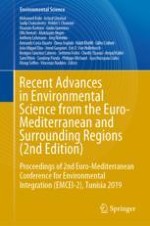2021 | OriginalPaper | Chapter
Recycling Way of Sludge in Handcraft Pottery (Marrakesh, Morocco)
Authors : Rachida Bouachera, Mariam El Aoud, Rachida Kasimi, Mounsif Ibnoussina, Yassine Taha, Hicham El Boudour El Idrissi, Rachid Hakkou
Published in: Recent Advances in Environmental Science from the Euro-Mediterranean and Surrounding Regions (2nd Edition)
Publisher: Springer International Publishing
Activate our intelligent search to find suitable subject content or patents.
Select sections of text to find matching patents with Artificial Intelligence. powered by
Select sections of text to find additional relevant content using AI-assisted search. powered by
